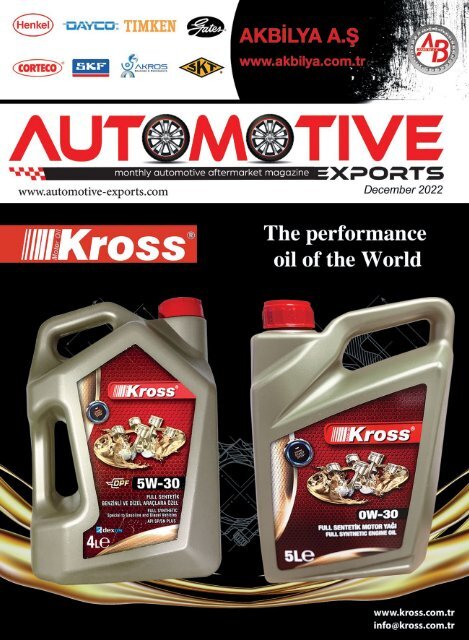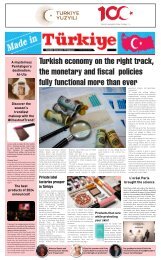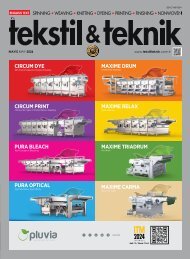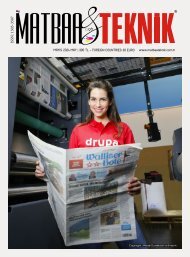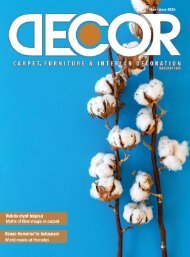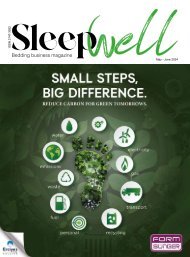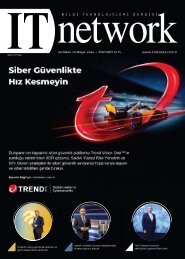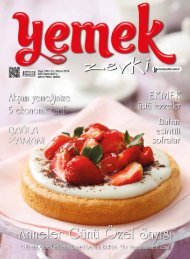Automotive Exports December 2022
You also want an ePaper? Increase the reach of your titles
YUMPU automatically turns print PDFs into web optimized ePapers that Google loves.
1
Monthly automotive aftermarket magazine<br />
GROUP CHAIRMAN<br />
H. FERRUH ISIK<br />
PUBLISHER:<br />
İstmag Magazin Gazetecilik<br />
İç ve Dış Ticaret Ltd. Şti.<br />
Managing Editor (Responsible)<br />
Mehmet Söztutan<br />
mehmet.soztutan@img.com.tr<br />
Editor<br />
Ali Erdem<br />
ali.erdem@img.com.tr<br />
EDİToR<br />
Mehmet Soztutan, Editor-in-Chief<br />
mehmet.soztutan@img.com.tr<br />
Advertising Managers<br />
Adem Saçın<br />
+90 505 577 36 42<br />
adem.sacin@img.com.tr<br />
Enes Karadayı<br />
enes.karadayi@img.com.tr<br />
International Marketing Coordinator<br />
Ayca Sarioglu<br />
ayca.sarioglu@img.com.tr<br />
Editor<br />
Yusuf Okçu<br />
yusuf.okcu@img.com.tr<br />
Finance Manager<br />
Cuma Karaman<br />
cuma.karaman@img.com.tr<br />
Digital Assets Manager<br />
Emre Yener<br />
emre.yener@img.com.tr<br />
Technical Manager<br />
Tayfun Aydın<br />
tayfun.aydin@img.com.tr<br />
Design & Graphics<br />
Sami aktaş<br />
sami.aktas@img.com.tr<br />
Accountant<br />
Yusuf Demirkazık<br />
yusuf.demirkazik@img.com.tr<br />
Subsciption<br />
İsmail Özçelik<br />
ismail.ozcelik@img.com.tr<br />
HEAD OFFICE:<br />
İstmag Magazin Gazetecilik<br />
İç ve Dış Ticaret Ltd. Şti.<br />
Ihlas Media Center<br />
Merkez Mah. 29 Ekim Caddesi No: 11B / 21<br />
Yenibosna Bahcelievler, Istanbul / TÜRKİYE<br />
Tel: +90 212 454 22 22<br />
www.img.com.tr sales@img.com.tr<br />
KONYA:<br />
Metin Demir<br />
Hazım Uluşahin İş Merkezi C Blok<br />
Kat: 6 No: 603-604-605 KONYA<br />
Tel: (90.332)238 10 71 Fax: (90.332)238 01 74<br />
Reaping the fruits of export-drive<br />
As noted earlier in this column, the exports by Turkish automotive sector have reached<br />
remarkable figures in the last decade. The automotive industry has been active since<br />
the early seventies. Thus, Turkey has become a major production platform for global<br />
automotive manufacturers.<br />
As known, the auto parts industry has recorded a dynamic growth in line with the<br />
automotive industry. From simple components in the mid-1960s, the sector has ascended<br />
to produce high-tech components.<br />
The industry with its large capacity, wide variety of production and high standards,<br />
supports automotive industry production and the vehicles in Turkey and also has ample<br />
potential for additional exports.<br />
The leading foreign automotive parts manufacturers have established their presence in the<br />
country through joint-ventures, which dominate production and exports. There has also<br />
been substantial locally-owned investment by spare parts manufacturers.<br />
To sum up:<br />
- Quality of production improved dramatically, especially through the establishment of<br />
quality management systems.<br />
- The industry has adapted to EU regulations and has established an efficient and<br />
exemplary cooperation with public institutions in the transformation of the EU regulations<br />
to national regulations and their implementation.<br />
- <strong>Exports</strong> have risen sharply, and Turkish production has been integrated into<br />
manufacturers’ global planning.<br />
Key factors which attract foreign capital inflows to Turkey mainly include the market size,<br />
consumer composition, friendly investment legislation and liberal banking system together<br />
with other attractiveness arising from highly skilled human resources in production and<br />
management, the unsaturated domestic market with high potential, easy access to<br />
neighboring (regional) emerging markets, and low labor cost.<br />
The industry exhibits its full potential in major specialized fairs both at home and abroad.<br />
By participating in a series of fairs, our publications remain at the service of those<br />
businesses people seeking to increase their share in the increasingly competitive foreign<br />
markets.<br />
This month, we participate in Moroccan <strong>Automotive</strong> Industry Show, Casablanca.<br />
We are fully convinced that the event would pave the way for a series of new business<br />
opportunities. We wish all participants success and lucrative business.<br />
PRINTED BY:<br />
İHLAS GAZETECİLİK A.Ş.<br />
Merkez Mahallesi 29 Ekim Caddesi İhlas Plaza<br />
No:11 A/41 Yenibosna–Bahçelievler/ İSTANBUL<br />
Tel: 0212 454 30 00<br />
www.ihlasmatbaacilik.com<br />
automotiveexport<br />
automotiveexports
Germany ‘on course for<br />
recession’ as industrial<br />
orders drop<br />
German industrial orders have dropped by more than<br />
expected in September as foreign demand slumped, putting<br />
Europe’s largest economy on course for recession, data<br />
shows.<br />
New orders fell by 4.0 percent on the month on a seasonally<br />
and calendar-adjusted basis, the Federal Statistics Office said.<br />
Germany staved off the threat of recession in the third<br />
quarter with unexpected growth, but the economy remained<br />
in choppy waters as high inflation driven by a painful energy<br />
standoff with Russia surged, data showed.<br />
The orders data underlined the headwinds Germany is facing<br />
as the sluggish global economy, materials shortages and the<br />
energy crisis hamper production.<br />
Headed towards recession<br />
“The German economy is on course for recession - that<br />
much can be deduced from the disastrous new orders,” said<br />
Thomas Gitzel, chief economist VP Bank.<br />
While domestic orders increased by 0.5 percent, foreign<br />
orders plunged b y 7.0 percent. Within the euro zone, orders<br />
were down 8.0 percent while orders from outside the euro<br />
zone dropped 6.3 percent.<br />
“The high level of new orders that had set in after the<br />
coronavirus pandemic as a result of catch-up effects appears<br />
to have come to an end,” the economy ministry said.<br />
Decreases in the automotive and mechanical engineering<br />
sectors in particular, down 9.0 percent and 8.1 percent<br />
respectively, dragged down the overall index, according to the<br />
ministry.<br />
10
Famed Kapadokya most-loved color of<br />
Türkiye’s national car Togg<br />
Türkiye’s first national, fully electric car<br />
Togg, which recently saw the first massproduced<br />
vehicle come off from the<br />
production line, revealed its most-preferred<br />
color through a survey.<br />
The survey was conducted with the<br />
participation of 500,000 people from Togg’s<br />
social media account.<br />
According to the results, the color<br />
“Kapadokya” (Cappadocia in Turkish)<br />
which is among the total of six colors that<br />
“Togg took inspiration from the beauties of<br />
Türkiye” was the most popular color of the<br />
C-SUVs.<br />
The colors include “Anadolu” (Anatolia),<br />
“Gemlik,” “Oltu,” “Kula,” “Kapadokya” and<br />
“Pamukkale.”<br />
Kapadokya is the color representing the<br />
colors of the fairy chimneys in Türkiye’s<br />
famed touristic region of Cappadocia in the<br />
central province of Nevşehir.<br />
Anatolia is a red “reflecting the friendliness<br />
and passion of Anatolian lands.”<br />
Gemlik is a turquoise blue color which<br />
represents the blue waters under the<br />
shade of olive trees in Gemlik located on<br />
the coast of the Marmara sea.<br />
Kula is gray, taking its inspiration from<br />
the “magnificence of Kula, which carries<br />
millions of years of history of Earth to the<br />
present with its natural structure, rocks and<br />
valleys,” in Türkiye’s Aegean region.<br />
The black color of Oltu represents the<br />
eye-catching blackness, shiny texture and<br />
solid structure of the Oltu stone, one of<br />
the rare and fascinating gemstones found<br />
in the eastern Erzurum province. The color<br />
Pamukkale, meanwhile, is a while color,<br />
the dazzling whiteness of Pamukkale’s<br />
travertines in western Türkiye’s Denizli.<br />
In addition to the SUV, Togg will be<br />
manufacturing another four models – a<br />
sedan, C-hatchback, B-SUV and B-MPV –<br />
through 2030.<br />
Mass production of the SUV will be<br />
followed by the sedan. The vehicle is being<br />
produced by a consortium of five Turkish<br />
companies called the Automobile Initiative<br />
Group of Türkiye, or Togg in short, in<br />
cooperation with the Union of Chambers<br />
and Commodity Exchanges of Türkiye<br />
(TOBB).<br />
The brand aims to produce 1 million<br />
vehicles across the five segments by 2030.<br />
<strong>December</strong> <strong>2022</strong> 14
Turkish auto sales jump nearly 15% in October<br />
Sales of passenger cars and light<br />
commercial vehicles in Türkiye rose 14.9%<br />
year-over-year in October, according to<br />
data provided by an industry group.<br />
A total of 65,222 vehicles were sold across<br />
the country, the <strong>Automotive</strong> Distributors<br />
Association (ODD) said in a statement.<br />
Passenger cars accounted for nearly 73% or<br />
47,440 of the sales, an increase of 17.1%<br />
during the same period.<br />
As many as 17,782 light commercial<br />
vehicles were also sold, up 9.5% from<br />
a year earlier. The association said the<br />
automotive market fell 4.6% compared to<br />
the average 10-year October sales.<br />
In the January-October period, Türkiye’s<br />
automotive market narrowed by 4.7% on<br />
an annual basis to 585,752 vehicles.<br />
Passenger car sales fell 6% to 446,664 units<br />
in the first 10 months of <strong>2022</strong> compared to<br />
the same period from a year ago.<br />
<strong>December</strong> <strong>2022</strong> 16
Turkish automotive exports remain robust<br />
despite global headwinds<br />
Turkish automotive exports jumped to<br />
$2.65 billion (TL 49.21 billion) in October,<br />
industry data showed , in an increase<br />
that comes despite global headwinds<br />
dominated by talks of recession and<br />
surging inflation.<br />
<strong>Exports</strong> increased by 1.8% year-over-over,<br />
the Uludağ <strong>Automotive</strong> Industry Exporters’<br />
Association (OIB) said in a statement. At<br />
12.4%, the industry held the largest share<br />
of Türkiye’s overall exports.<br />
Foreign sales were up about 5% from a<br />
year ago in the January-October period to<br />
some $25 billion, the data showed.<br />
“Our automotive exports continue to<br />
increase” despite the growing global<br />
recession risks, contraction in the<br />
eurozone, the industry’s largest market,<br />
and surging inflation, OIB Chairman Baran<br />
Çelik said.<br />
The supply industry, tractors, buses,<br />
minibusses and midibuses all saw a doubledigit<br />
increase in sales in October, Çelik said.<br />
The supply industry topped exports with $1<br />
billion worth of sales, a 13% year-over-year<br />
increase.<br />
Çelik said exports to top markets such<br />
as Germany, Belgium and Russia also<br />
registered double-digit increases in the<br />
month.<br />
Sales to Germany were up 15% year-overyear<br />
in October to $404 million, while<br />
those to the United Kingdom rose 9% to<br />
$285 million, the data showed. <strong>Exports</strong> to<br />
France were down 12% to $252 million.<br />
Sales to Belgium, Russia, Romania and<br />
Portugal increased by 32%, 23%, 21% and<br />
79%, respectively.<br />
<strong>December</strong> <strong>2022</strong> 22
Togg invites citizens to test<br />
SUV model at new Istanbul center<br />
Türkiye’s first indigenous electric<br />
automobile brand Togg is opening its first<br />
experience center in Istanbul, enabling<br />
citizens to get to know its C-SUV model<br />
from a closer perspective.<br />
A total of 20 centers are expected to be<br />
opened across the country.<br />
The first Togg experience center opened<br />
its door in the metropolis’ Zorlu Center,<br />
welcoming citizens to examine the C-SUV<br />
model closely, particularly the parts they<br />
are curious about. The next experience<br />
centers will soon start operating in<br />
southern Adana, the capital Ankara, Gemlik<br />
and western Izmir province.<br />
The opening comes after the inauguration<br />
of Togg’s factory in the Gemlik district<br />
of Türkiye’s automotive capital Bursa,<br />
during which the first mass-produced SUV<br />
model left the production line. Following<br />
the announcement of the vehicle’s mass<br />
production, high interest in the first<br />
domestic electric car was seen both in the<br />
country and abroad.<br />
It has received thousands of orders<br />
coming from the public sector in Türkiye,<br />
including banks that were placed on the<br />
priority list for receiving their models<br />
earlier than others. Togg also received<br />
its first international order recently, from<br />
Azerbaijani President Ilham Aliyev who<br />
stated that he wants to purchase two cars<br />
for himself. Many citizens have also already<br />
listed their existing vehicles for sale on the<br />
internet in order to buy a Togg, which will<br />
hit the road in March 2023. Around 17,000<br />
to 18,000 vehicles are planned to be put<br />
up for sale in the first stage, throughout<br />
2023, after some five months of security<br />
procedures the car is set to pass through.<br />
The vehicle is being produced by a<br />
consortium of five Turkish companies called<br />
the Automobile Initiative Group of Türkiye,<br />
or Togg, in cooperation with the Union of<br />
Chambers and Commodity Exchanges of<br />
Türkiye (TOBB).<br />
Togg, which will have “300+” and “500+”<br />
kilometer range options with its inborn<br />
electric modular platform, will be<br />
constantly connected to the center and<br />
will be able to receive updates remotely<br />
via 4G/5G connection. The batteries of the<br />
vehicles which will be integrated into the<br />
model, and are compatible with the Euro<br />
NCAP 5-star level rating system are set to<br />
get 80% full in less than 30 minutes with<br />
fast charging option.<br />
<strong>December</strong> <strong>2022</strong> 24
Türkiye<br />
seeks energy<br />
production<br />
abroad, says<br />
Minister<br />
Dönmez<br />
Türkiye wants to engage in production<br />
activity in counties from which it buys<br />
natural gas or oil, Energy Minister Fatih<br />
Dönmez has said, adding that studies are<br />
underway to identify the location for a<br />
third nuclear plant.<br />
“This is our new energy strategy. We<br />
consider establishing partnerships with<br />
those countries to acquire a share in<br />
the production of natural gas or oil. We<br />
have been receiving offers, particularly<br />
from Africa, since we have increased<br />
our operations capabilities in the seas,”<br />
Dönmez said.<br />
“Those countries look very favorably upon<br />
this idea and we have invited them to our<br />
country. We can act together with friendly<br />
nations,” he said, unveiling the new energy<br />
strategy in a press meeting.<br />
“We traveled to Indonesia and Malaysia.<br />
In Malaysia, we discussed the prospects of<br />
natural gas exploration and cooperation.”<br />
Türkiye has played an important role over<br />
the past years in strengthening energy<br />
supply security for neighboring countries,<br />
Dönmez added.<br />
“While improving our own infrastructure,<br />
we have secured new resources. We are<br />
buying natural gas from Russia, Iran and<br />
Azerbaijan.”<br />
Türkiye has also increased its LNG capacity<br />
bbyputting two FRSUs (Floating Storage<br />
Regasification Unit) in use in addition to<br />
the already existing two LNG land terminals<br />
and a third FRSU will be launched in Saros,<br />
he noted.Dönmez stressed that Türkiye<br />
may further diversify its suppliers of natural<br />
gas.<br />
“The Gulf countries may deliver gas here.<br />
Israeli gas can arrive here, and we may<br />
buy gas from Nigeria. We are in talks with<br />
Libya.”<br />
The minister added that all natural gas<br />
storage facilities were full as of the end of<br />
September and ready for the winter. “They<br />
will be used if problems with deliveries via<br />
pipelines may occur.”<br />
He also said that work is ongoing to<br />
determine the location where the<br />
country’s third nuclear power plant<br />
will be established. “The likely location<br />
is the Thrace region,” Dönmez added.<br />
Construction of the Akkuyu Nuclear Power<br />
Plant continues at “full speed,” he said,<br />
recalling that a second nuclear plant is<br />
planned to be built in the province of<br />
Sinop.<br />
<strong>December</strong> <strong>2022</strong> 26
Russia increases gas exports<br />
to China, reducing market<br />
dependence on Europe<br />
In an attempt to wean the country from its<br />
dependence on the European gas market,<br />
Russia has increased gas exports to China,<br />
using the Siberia pipeline.<br />
The pipeline, also known as the Eastern<br />
Route, delivers energy “via the mega gas<br />
pipeline regularly” and it exceeds daily<br />
“contractual obligations”.<br />
The pipeline became functional in 2019,<br />
spanning 3,000 kilometres, and has the<br />
capacity of carrying 61 billion cubic metres<br />
of gas per year, with 38 billion cubic metres<br />
slated for export.<br />
The two countries are working toward<br />
developing another gas route through<br />
Mongolia called Soyuz Vostok.<br />
Expanding its energy market in China has<br />
been one of its top priorities for Russia. As<br />
Beijing is in the process of phasing down<br />
coal usage, the Kremlin seems eager to<br />
“exploit the opportunity” in light of their<br />
growing alliance.<br />
Gazprom, the Russian energy giant, said<br />
that it supplied 42.6 percent less gas to<br />
countries outside the Commonwealth of<br />
Independent States (CIS), a segment that<br />
includes most of the European Union.<br />
The Gazprom report noted that total<br />
exports had decreased from 158.8 billion<br />
cubic metres (bcm) of gas in the first ten<br />
months of 2021 to 91.2 bcm in the first ten<br />
months of <strong>2022</strong>.<br />
European countries whose gas purchases<br />
from Gazprom remain capped have been<br />
stockpiling gas thanks to unusually mild<br />
autumn weather –– Bloomberg noted that<br />
in the past, Russia had regularly supplied<br />
about a third of Europe’s gas consumption.<br />
Even while EU gas storage sites remain<br />
at a 94 percent capacity, higher than the<br />
past five years’ seasonal average of 89<br />
percent, Bloomberg pointed out the words<br />
of Gazprom Chief Executive Officer Alexey<br />
Miller, who said if the weather were to<br />
get abnormally cold, Europe’s gas reserves<br />
wouldn’t keep citizens warm throughout<br />
the winter.<br />
Bloomberg quoted Miller as adding<br />
“Europe could lack some 800 million<br />
cubic metres of gas a day without Russian<br />
supplies during high demand.”<br />
According to Bloomberg, Gazprom<br />
continues to supply gas flows via Ukraine<br />
at capped levels and “those to Hungary<br />
and Serbia are going through one leg of the<br />
TurkStream pipeline” that runs from Russia<br />
to Türkiye<br />
<strong>December</strong> <strong>2022</strong> 28
More tourists to rush to Türkiye this<br />
winter as European prices soar<br />
Turkish travel companies are expecting a<br />
rush of European tourists in the months<br />
ahead amid higher demand following the<br />
coronavirus pandemic and as energy prices<br />
rocket.<br />
“This winter we expect more tourists<br />
than in previous years,” Cem Polatoğlu,<br />
spokesperson for the travel operators’<br />
association Tur Operatörleri Platformu, told<br />
Deutsche Presse-Agentur (dpa).<br />
“During the pandemic, people could not go<br />
on holiday for a long time. Now that travel<br />
restrictions have been lifted, many tourists<br />
will feel as though they have ‘broken free<br />
from chains,’” he said.<br />
Additionally, the high costs of energy in<br />
Europe are also leading to an increase in<br />
reservations during the winter season,<br />
particularly for accommodation that costs<br />
less, he said.<br />
Europe faces an acute energy crunch<br />
heading into winter after Russia cut gas<br />
supplies in response to Western sanctions<br />
imposed over its invasion of Ukraine.<br />
“It is positive for the tourism sector that<br />
European tourists – especially pensioners<br />
– prefer long holidays in Türkiye during<br />
the winter months due to the increase in<br />
natural gas prices,” said Ali Onaran, chair of<br />
tour operator Prontotour.<br />
He said his data showed that demand<br />
was particularly high “from countries like<br />
Germany, England and the Netherlands.”<br />
Onaran said it was encouraging that more<br />
people were booking their holidays during<br />
the winter period despite global inflation.<br />
“There are developments such as rising fuel<br />
costs, energy expenses, food crises, which<br />
affect ticket and hotel prices and therefore<br />
people’s overall travel budget,” he said.<br />
Despite those factors, bookings were in line<br />
with tour operators’ expectations.<br />
A further incentive for people to head to<br />
Türkiye on their holidays may be the weak<br />
Turkish lira, according to Polatoğlu.<br />
For tourists, he said that booking a package<br />
holiday at a five-star hotel in Türkiye<br />
currently costs less than spending the time<br />
in Europe. “And with much more comfort<br />
than at home,” Polatoğlu added.<br />
Rebound in Türkiye’s critical tourism<br />
industry this year has been driven by<br />
a major leap in demand from Europe,<br />
spearheaded by Germany and the United<br />
Kingdom, as well as Russia.<br />
The number of holidaymakers more<br />
than doubled in the first eight months<br />
of the year. Around 29.3 million tourists<br />
arrived in Türkiye from January through<br />
August, marking a 108.5% climb from a<br />
year ago, on pace to roughly match the<br />
pre-pandemic levels of 2019, according to<br />
Culture and Tourism Ministry data.<br />
The first eight-month figure stood at 14.1<br />
million in 2021, 7.2 million in 2020 and 31<br />
million in 2019.<br />
The arrivals have been mainly backed by<br />
Russian visitors, who increasingly opted for<br />
Türkiye due to flight restrictions applied<br />
by Western countries after Russia invaded<br />
Ukraine, as well as tourists from Europe.<br />
However, the number of German and<br />
British visitors rose strongly this year.<br />
At 3.85 million, tourists from Germany<br />
topped the list among nations and made up<br />
13% of all visitors in the first eight months,<br />
with arrivals jumping 105.73% from a year<br />
ago. Russians followed with just over 3<br />
million, a 22.8% year-over-year increase,<br />
and Britons ranked third with 2.36 million,<br />
a whopping 2,120% surge from the same<br />
period in 2021, according to the data.<br />
Tourism revenues are vital to Türkiye’s<br />
economy as the government’s new<br />
economic program focuses on flipping<br />
the chronic current account deficits to a<br />
surplus, prioritizing exports, production<br />
and investments, and aiming to lower the<br />
increase in consumer prices.<br />
The government raised its year-end targets<br />
in July to 47 million tourists and $37 billion<br />
in revenues, up from its earlier targets<br />
of 45 million arrivals and $35 billion in<br />
income. The number of foreign visitors<br />
soared 94.1% to 24.71 million last year<br />
when COVID-19 measures were eased<br />
compared to 2020. Tourism revenues<br />
doubled to almost $25 billion but remained<br />
well below the level recorded in 2019.<br />
<strong>December</strong> <strong>2022</strong> 30
10-month<br />
Turkish furniture,<br />
paper exports<br />
outperform 2021<br />
figures<br />
Türkiye’s total exports of furniture, paper<br />
and forestry industry products have<br />
reached $6.92 billion (TL 128.75 billion)<br />
in the January-October period, with an<br />
increase of 24% compared to the same<br />
period of the previous year, data showed.<br />
While the increase in overall exports across<br />
the country was 15% in 10 months, there<br />
was a 24% increase in the furniture sector.<br />
With this rise, the sector almost reached<br />
the exports made throughout 2021 which<br />
was $6.99 billion, the data by the Istanbul<br />
Furniture, Paper and Forest Products<br />
Exporters’ Association (ORSİAD) showed.<br />
The share of the furniture industry,<br />
meanwhile, in this figure amounted to<br />
$3.93 billion with an increase of 13.9%.<br />
Erkan Özkan, head of the ORSİAD, said<br />
that although there were difficulties in<br />
supplying raw material all over the world,<br />
adding, however, that “our exporting<br />
companies were affected by this at a<br />
minimum level with the bilateral relations<br />
they have established.”<br />
He said they aim to reach $5 billion in<br />
furniture exports by the end of this year by<br />
maintaining the current success.<br />
Iraq took the lion’s share with $432.1<br />
million among the countries to which the<br />
furniture industry exported the most,<br />
followed by Germany with $333 million and<br />
Israel with $207.8 million.<br />
Meanwhile, Türkiye’s furniture exports to<br />
Qatar rose by 97% making it the country<br />
with the highest increase in exports this<br />
year.<br />
The most exported products of the sector<br />
in the said period were bedsteads and<br />
cradles for children, wooden furniture for<br />
dining and living rooms, metal furniture<br />
and compact furniture that can be turned<br />
into a bed.<br />
<strong>December</strong> <strong>2022</strong> 32
<strong>Automotive</strong> exports top<br />
$2.6 billion in October<br />
Türkiye’s automotive exports increased<br />
by 1.8 percent in October from a year ago<br />
to $2.65 billion, the Uludağ <strong>Automotive</strong><br />
Industry Exporters’ Association (OİB) has<br />
said.<br />
The industry’s share in the country’s overall<br />
export revenues was 12.4 percent.<br />
“Despite inflation, looming risks from the<br />
global recession and the contraction in<br />
the eurozone, our exports continued to<br />
grow,” said Baran Çelik, board chair of OİB,<br />
noting double-digit increases in sales to the<br />
German, Russian and Belgian markets.<br />
The supply industry’s exports rose by 13<br />
percent in October from the same month<br />
of 2021 to reach $1 billion but passenger<br />
car exports dropped 20 percent year-onyear<br />
to $748 million, according to data<br />
from the OİB.<br />
<strong>Exports</strong> of towing vehicles exhibited an<br />
annual increase of 95 percent to stand at<br />
$214 million.<br />
Germany was the largest market for<br />
local automotive companies. <strong>Exports</strong> to<br />
Germany grew 15 percent from a year ago<br />
to $404 million. The U.K. came second at<br />
$285 million, rising 9 percent on an annual<br />
basis. <strong>Exports</strong> to France increased by 12<br />
percent compared with October 2011 to<br />
$252 million.<br />
Data from the OİB also showed that<br />
exports to other key markets, namely<br />
Belgium, Russia, Romania and Portugal<br />
grew by 32 percent, 23 percent, 21 percent<br />
and 79 percent, respectively.<br />
From January to October, the automotive<br />
industry’s exports reached $25 billion,<br />
exhibiting an annual increase of 5 percent.<br />
Türkiye may become important global<br />
player<br />
Meanwhile, Tuğrul Arıkan, general manager<br />
of carmaker Anadolu Isuzu, said that no<br />
country in the global supply chain has as<br />
strong infrastructure in the automotive<br />
industry as Türkiye has. Türkiye may<br />
become an important global player in<br />
this field, replacing other companies as a<br />
supplier, he added.<br />
“There will be much better developments<br />
for the Turkish automotive sector going<br />
forward in 2023 and 2024. We need to<br />
catch up with the ongoing technological<br />
transformation in the supply and main<br />
automotive ndustries and we need<br />
to encourage the use of domestically<br />
manufactured products,” Arıkan said.<br />
As far as Anadolu Isuzu’s operations are<br />
concerned, Arıkan noted that last year the<br />
company introduced its first 8-meter-long<br />
electric bus to the market. “We are working<br />
to launch the 12-meter and 18-meter long<br />
buses in 2023 and thereafter. We are also<br />
working on an electric minibus,” he said.<br />
Anadolu Isuzu is also looking into hydrogen<br />
technology, Arıkan added.<br />
“Our main focus is electric [cars] but we<br />
have started studies on hydrogen. We have<br />
identified the companies which we are<br />
going to work with. Hopefully, we will be<br />
able to introduce our hydrogen vehicle,<br />
which will be more likely an inner-city bus,<br />
at the end of 2024 or in early 2025,” he<br />
said.<br />
<strong>December</strong> <strong>2022</strong> 36
Turkish Airlines teams up with exporters<br />
Under the deal, the flag carrier will<br />
offer discounts between 5 to 30 percent<br />
for cargo weighing more than 1 ton to<br />
be delivered to 40 destinations in 31<br />
countries.<br />
Turkish Airlines will deliver regular goods as<br />
well as perishable products such as fruits,<br />
vegetables, fish and eggs.<br />
Turkish Cargo was the fastest growing<br />
air cargo carrier in the world in 2021<br />
and <strong>2022</strong> and increased its share in the<br />
market to 5 percent, said Ahmet Bolat, the<br />
chairman of Turkish Airlines’ board and<br />
executive committee, noting that with its<br />
performance Turkish Cargo was ranked<br />
fourth among the top air cargo companies<br />
in the world.<br />
Bolat recalled that the carrier previously<br />
signed two protocols with the TİM during<br />
the pandemic to deliver exporters’ cargos<br />
to different destinations.<br />
The latest agreement inked with the TİM<br />
foresees an export volume of $2.1 billion,<br />
he added.<br />
“Türkiye’s average export range is presently<br />
3,065 kilometers, but we want to increase<br />
this to the world average of 4,744<br />
kilometers,” said Mustafa Gültepe, the<br />
president of the TİM.<br />
This year, exports by air have reached $10.3<br />
billion and 158,000 tons of goods were<br />
delivered by air cargo, he added.<br />
Turkish Airlines reported earlier this month<br />
that its cargo revenues soared 140 percent<br />
in January-September this year from the<br />
same period of 2019 to $2.92 billion.<br />
<strong>December</strong> <strong>2022</strong> 38
Türkiye’s historical record in the<br />
Global Innovation Index<br />
In the Global Innovation Index announced<br />
by the World Intellectual Property<br />
Organization, the Switzerland-based<br />
organization of the United Nations, and<br />
in which 132 countries compete, Türkiye<br />
rose four steps in <strong>2022</strong> to the 37th place.<br />
Rising 14 places in the last two years,<br />
Türkiye managed to enter the top 40 in the<br />
index for the first time. The <strong>2022</strong> Global<br />
Innovation Index was announced by the<br />
World Intellectual Property Organization<br />
(WIPO), the Swiss-based agency of the<br />
United Nations, with the main theme<br />
“What is the Future of Innovation-Driven<br />
Growth?”. In the index, which evaluates<br />
132 countries, Türkiye continued its upward<br />
trend and reached the best position in its<br />
history with 37th place. Türkiye, which has<br />
improved by 14 steps in the last two years,<br />
also maintained its 4th place among the<br />
upper-middle income group countries.<br />
Among the upper-middle income group<br />
countries, Türkiye performed above<br />
the group averages in six of the 7 main<br />
components. Türkiye’s best performing<br />
component was “Innovative Outcomes”.<br />
In this component, Türkiye ranked 15th<br />
with an increase of 20 steps compared to<br />
last year, ranking first among the North<br />
Africa/West Asia group countries. In the<br />
“Versatility of Markets” component, it rose<br />
12 places to 37th. This year, Türkiye, which<br />
outperformed its inputs in innovation<br />
outputs, managed to take place in the<br />
top 10 in 6 indicators. Türkiye ranked first<br />
among 132 countries in the “industrial<br />
designs by origin” indicator.<br />
The report also highlighted that Istanbul<br />
and Ankara are home to two leading<br />
science and technology clusters. Istanbul<br />
moved up four spots to 46th among the<br />
best science and technology clusters,<br />
overtaking Brussels, Barcelona, and Zurich.<br />
Evaluating the Global Innovation Index<br />
<strong>2022</strong> Report, Industry and Technology<br />
Minister Mustafa Varank said, “Türkiye is<br />
at its highest level in its history. We have<br />
moved up 14 places in the last two years,<br />
ranking 37th out of 132 countries. The R&D<br />
and innovation ecosystem that we have<br />
built from scratch in 20 years will continue<br />
to write new success stories.”<br />
Stating that they have implemented<br />
policies and mechanisms that support<br />
innovation with the vision of the National<br />
Technology Move for Türkiye, and that<br />
they have deepened our R&D, innovation<br />
and entrepreneurship ecosystem day by<br />
day, Minister of Industry and Technology<br />
Mustafa Varank emphasized that the index<br />
is an effective policy tool in evaluating and<br />
improving the innovation performance of<br />
countries. Varank said in his statement:<br />
“I think the index has 3 main benefits.<br />
Firstly, it allows to analyze innovation<br />
performance from different angles on<br />
an annual basis and with comprehensive<br />
indicators. Secondly, it allows to discover<br />
potential areas of intervention by seeing<br />
<strong>December</strong> <strong>2022</strong> 40
the strengths and weaknesses of the<br />
ecosystem. Finally, it lays the groundwork<br />
for the development of evidence-based<br />
structural reforms to address these areas of<br />
intervention. In this direction, we have first<br />
established the Türkiye Global Innovation<br />
Index Task Force. Then, we determined<br />
the responsible institutions for the missing<br />
or outdated data in the index, and we<br />
started the cooperation process with the<br />
international organizations that provide<br />
data to the index. In order to monitor the<br />
developments in the indicators, we have<br />
established the Global Innovation Index<br />
Coordination and Monitoring Platform. As a<br />
result of the policies we have implemented,<br />
support mechanisms and initiatives we<br />
have initiated, our country has achieved<br />
this historic success.”<br />
Evaluating the Global Innovation Index<br />
<strong>2022</strong> Report, Minister of Trade Dr. Mehmet<br />
Muş made the following assessment:<br />
“Today, innovation is consolidating its<br />
place among the main determinants of<br />
economic growth and competitiveness<br />
in the international arena day by day.<br />
From the invention of agriculture and the<br />
discovery of the wheel to the present day,<br />
when we have smartphones in our hands<br />
that have millions of times more powerful<br />
operating capacity than the computers<br />
in the control room of Apollo 11, which<br />
carried astronauts to the moon in 1969,<br />
mankind has always been in elbow contact<br />
with innovation. With the beginning of<br />
the 21st century, the innovation that<br />
emerged in many areas such as self-driving<br />
tools, artificial intelligence applications<br />
and blockchain technologies, big data<br />
applications, which we came across<br />
in science fiction novels or films a few<br />
decades ago, has started to rapidly shape<br />
and transform the future of countries and<br />
humanity. In innovation, speed is not our<br />
enemy, on the contrary, it is our closest<br />
friend today, where innovative ideas and<br />
practices are faster than ever before. For<br />
this reason, Türkiye’s reaching the place<br />
it deserves in the world in the innovation<br />
race is perhaps one of the guarantees of<br />
taking firm steps forward to the future as<br />
an existential issue. Moreover, I believe<br />
that it has become impossible to predict<br />
the fate of countries from now on free<br />
from the efforts and outputs of innovation<br />
and technological development.<br />
The effective innovation requires a strong<br />
innovation ecosystem that emerges<br />
with the harmonious cooperation and<br />
interaction of many stakeholders and<br />
elements such as public and private<br />
sector institutions and organizations,<br />
universities, investors, companies,<br />
supportive political and legal<br />
infrastructure, resource allocation.<br />
Here, in addition to what the public<br />
should do, all our companies, especially<br />
our exporter companies, Innovative a<br />
necessity to make a technology-oriented<br />
future planning with a perspective,<br />
innovation I think raising awareness is a<br />
vital issue. As a matter of fact, the fact<br />
that we have started to reap the fruits of<br />
our R&D studies in the defense industry<br />
has proved to all of us how important<br />
this field is. We, as the Ministry, always<br />
work with our companies’ technology<br />
and innovation we see assisting and<br />
consulting with their focused efforts as a<br />
necessity beyond satisfaction.<br />
When we look at the patent application<br />
data of the World Intellectual Property<br />
Rights Organization, we see that there<br />
is a positive trend in Türkiye’s patent<br />
applications and that approximately 10<br />
thousand patent applications have been<br />
filed annually in recent years. I believe<br />
that technology and innovation with<br />
the further increase of focused business<br />
culture and awareness, our country will<br />
rise to much higher ranks in the world<br />
in both our R&D expenditures and<br />
international patent applications and<br />
acceptances.”<br />
TİM Chairman Mustafa Gültepe, who<br />
participated in the introductory meeting<br />
of the Global Innovation Index <strong>2022</strong><br />
with a video message, said that they<br />
lead exporters to adapt to the digital age<br />
with innovation. Emphasizing Türkiye’s<br />
success in innovation, TİM Chairman<br />
Gültepe continued:<br />
“Under the leadership of Mr. President,<br />
with the support of our Ministries and<br />
the contributions of our institutions<br />
in the task force, we rose 10 places<br />
to 41st in the index in 2021. Last<br />
year, we also broke the record in the<br />
history of the Republic by reaching<br />
225 billion dollars in exports. With<br />
TİM’s efforts towards the innovation<br />
and entrepreneurship ecosystem and<br />
the increasing competitiveness of our<br />
companies, Türkiye continued its rise this<br />
year. In <strong>2022</strong>, we broke the record of 15<br />
years in which the index was published<br />
and reached the highest position in our<br />
history with the 37th place. Innovationoriented<br />
growth will increase the<br />
competitiveness of our exporters and<br />
enable them to find a stronger place in<br />
global trade.<br />
Within the scope of the Investment<br />
Environment Improvement Coordination<br />
Board (YOIKK) Action Plan, the “Global<br />
Innovation Index Action Plan” studies<br />
were launched in 2020. At the meeting<br />
held under the chairmanship of Vice<br />
President Fuat Oktay on June 30, 2020, it<br />
was decided to establish a task force to<br />
accelerate the work to increase Türkiye’s<br />
position in the Global Innovation Index.<br />
Global Innovation Index Türkiye Action<br />
Plan and Strategy (2021-2023) was<br />
prepared. The strategy document, which<br />
was prepared with the coordination of<br />
the Ministry of Industry and Technology,<br />
the TİM Secretariat and the contributions<br />
of 20 different public institutions and<br />
organizations, will be presented to WIPO<br />
Director Daren Tang this year.<br />
<strong>December</strong><br />
<strong>2022</strong><br />
42
China’s chip<br />
maker to raise<br />
billions amid US<br />
export curbs<br />
Chinese chip manufacturer Hua Hong<br />
Semiconductor has received regulatory<br />
approval for an 18 billion yuan ($2.5 billion)<br />
IPO in Shanghai, according to a Hong Kong<br />
stock exchange filing.<br />
The planned initial public offering (IPO)<br />
comes as China’s chip companies gear up<br />
for steeper competition with the United<br />
States due to geopolitical tensions.<br />
US President Joe Biden introduced<br />
unprecedented export curbs aimed at<br />
stopping Beijing from acquiring advanced<br />
semiconductor technology.<br />
New rules bar American citizens, residents<br />
and green-card holders from working with<br />
China’s chip makers. Hua Hong says it<br />
intends to use the money to invest in a new<br />
fabrication plant – or fab – in the eastern<br />
city of Wuxi, with construction set to<br />
begin in 2023 and an eventual production<br />
capacity of 83,000 wafers per month.<br />
The company currently has four fabs in<br />
total – three 8-inch fabs in Shanghai,<br />
and one 12-inch fab in Wuxi currently<br />
expanding to 95,000 wafers per month.<br />
The proceeds from the IPO will also go<br />
to upgrading the latter fab, according to<br />
its prospectus. Hua Hong’s Shanghai IPO<br />
will follow that of China’s Semiconductor<br />
Manufacturing International Corp (SMIC),<br />
China largest chip manufacturer.<br />
Washington has barred US-based<br />
equipment makers from selling tools to<br />
Chinese foundries for production of logic<br />
chips produced at 14-nanometers and<br />
below. Hua Hong specialises in mature<br />
technology, and generates most of its<br />
revenue making chips using 55-nanometer<br />
process technology.<br />
The company has a global market share<br />
of 3.2 percent of the foundry business,<br />
according to research firm TrendForce.<br />
<strong>December</strong> <strong>2022</strong> 44
Türkiye foresees 5% economic growth for <strong>2022</strong>, 2023<br />
The leading indicators of the economy for<br />
the second half of <strong>2022</strong> point to moderate<br />
growth and Türkiye’s gross domestic<br />
product to grow 5% in <strong>2022</strong>, amid a global<br />
slowdown, Treasury and Finance Minister<br />
Nureddin Nebati said.<br />
Speaking to Parliament’s Planning and<br />
Budget Committee, Nebati said the<br />
economic growth, expected to maintain its<br />
balanced outlook in 2023, is targeted to be<br />
5% again next year.<br />
“In a period when challenging global<br />
conditions are experienced and the global<br />
conjuncture is changing rapidly, the<br />
‘Türkiye Economy Model’ aims to ensure<br />
macroeconomic and financial stability and<br />
price stability simultaneously, to encourage<br />
high value-added production, to turn the<br />
change in supply chains into an opportunity<br />
and to permanently solve the current<br />
account deficit problem,” Nebati reiterated.<br />
Stating that a significant improvement was<br />
achieved in the non-energy current account<br />
balance, significant gains were achieved in<br />
investment, employment, production and<br />
exports, Nebati said, “In this period when<br />
the risk of recession has increased for<br />
many developed and developing countries,<br />
the Turkish economy continues to grow<br />
strongly thanks to our model, and the<br />
composition of the growth also displays a<br />
balanced outlook.”<br />
“Türkiye is the fastest growing country in<br />
the G-20 with a GDP growth of 11.4% in<br />
2021 and recorded the highest growth rate<br />
in the last 50 years,” he said.<br />
Nebati noted that some 6.6 points of this<br />
growth come from domestic demand and<br />
4.8 points from net foreign demand and<br />
the net foreign demand to growth is the<br />
highest figure reached after 2001.<br />
“Despite the uncertainty caused by the<br />
war between Russia and Ukraine and the<br />
weakening global economy, our gross<br />
domestic product grew by 7.5% in real<br />
terms in the first half of <strong>2022</strong>,” he said,<br />
noting: “With a growth rate of 7.6% as of<br />
the second quarter, Turkey was among<br />
the fastest growing countries in the OECD.<br />
In the first half of the year, our economy<br />
maintained its balanced outlook in line<br />
with our sustainable and healthy growth<br />
target.”<br />
Goldman Sachs and Moody’s have also<br />
raised recently their forecast for Türkiye’s<br />
<strong>2022</strong> economic growth. Goldman Sachs<br />
said it revised upward its GDP growth<br />
forecast for Türkiye for this year to 5.5%<br />
from 3.5% while lifting its <strong>2022</strong> current<br />
account deficit forecast to $45 billion from<br />
$36 billion. Moody’s also said in a report<br />
in September that it raised its <strong>2022</strong> growth<br />
estimate to 4.5%, up from 3.5%.<br />
Nebati further commented that total<br />
employment in the country rose above<br />
the pre-pandemic period and reached<br />
historically high levels.<br />
Emphasizing that exports continue to<br />
break historical records, Nebati stated that<br />
with the steps taken within the scope of<br />
the Turkish Economy Model, exporters<br />
succeeded in turning the disruptions in the<br />
global supply chain into opportunities and<br />
made exports the locomotive of growth.<br />
“Our exports broke a record in every month<br />
of <strong>2022</strong> and reached the highest level in<br />
the history of the republic, exceeding the<br />
annualized $253 billion in October.”<br />
Nebati stated that total imports increased<br />
with energy imports, which remained high<br />
due to rising global energy prices.<br />
Pointing out that tourism has grown<br />
at a rate above the world average and<br />
outperformed its pre-pandemic levels,<br />
Nebati noted that they expect the course of<br />
tourism to continue for the rest of the year<br />
and a performance well above the record<br />
revenue in 2019.<br />
Nebati said, “While the current account<br />
balance gives a deficit due to energy<br />
imports, the current account balance<br />
excluding energy continues to have a<br />
surplus.”<br />
Nebati stated that the country aims to<br />
permanently improve the current account<br />
balance in the medium and long term with<br />
the policies implemented.<br />
Apart from the investments made in the<br />
renewables sector, the country aims to<br />
reduce foreign dependency on energy<br />
and to further reduce the pressure on<br />
the current account balance and external<br />
financing needs by commissioning the<br />
natural gas discovered in the Black Sea by<br />
2023, he added.<br />
Speaking on the fight against inflation,<br />
Nebati stated that they gave up TL 276.8<br />
billion ($14.89 billion) of tax revenue this<br />
year as part of this. Drawing attention<br />
to the tax cuts aimed at increasing the<br />
purchasing power and welfare of the<br />
citizens, Nebati said that they also support<br />
the most basic expenditures of the citizens.<br />
Reminding that they provide an 80%<br />
subsidy for natural gas used in households<br />
and 50% subsidies for electricity, Nebati<br />
said, “We provide electricity consumption<br />
support up to 150 kilowatt-hours to 2.1<br />
million households. Our target is to increase<br />
this support to 4 million households.”<br />
<strong>December</strong> <strong>2022</strong> 48
Winter eurozone recession looms as inflation hangs on<br />
The eurozone economy will slide into<br />
recession over the winter and will<br />
grow less than expected next year, the<br />
European Union’s executive commission<br />
said.The warning comes as peak inflation<br />
hangs on for longer than expected<br />
and high fuel and heating costs erode<br />
consumer purchasing power.<br />
High energy prices, the rising cost of<br />
living, higher interest rates and slowing<br />
global trade “are expected to tip the EU,<br />
the euro area, and most member states<br />
into recession in the last quarter of the<br />
year,” the forecast highlighted.<br />
The growth forecast for all of 2023 was<br />
lowered to 0.3% from the 1.4% expected<br />
in the previous forecast from July.<br />
“The EU economy is at a turning<br />
point,” said Paolo Gentiloni, European<br />
commissioner for the economy.<br />
“After a surprisingly strong first half of the<br />
year, the EU economy lost momentum in<br />
the third quarter and recent survey data<br />
point to a contraction for the winter,” he<br />
told reporters in Brussels. “The outlook<br />
for next year has weakened significantly.”<br />
The worst performer next year is likely to<br />
be Germany, Europe’s largest economy<br />
and one of the most dependent on<br />
Russian natural gas before the war in<br />
Ukraine. Germany was expected to see<br />
the output shrink by 0.6% over the next<br />
year.<br />
Gas and electricity prices have soared as<br />
Russia has dialed back supplies to Europe<br />
to a mere trickle of what they were before<br />
the invasion of Ukraine. European officials<br />
say the cutbacks are energy warfare by<br />
Russia to punish EU member countries<br />
for their support for Ukraine, while<br />
state-owned supplier Gazprom has cited<br />
technical reasons and a refusal by some<br />
customers to pay for gas in rubles.<br />
Inflation will peak later than expected,<br />
near the end of the year, and will lift the<br />
average rate to 8.5% for <strong>2022</strong> and to<br />
6.1% for 2023 in the eurozone. That is an<br />
upward revision of nearly 1 percentage<br />
point for <strong>2022</strong> and over 2 points for 2023.<br />
Two consecutive quarters of falling output<br />
is one common definition of recession,<br />
although the economists on the eurozone<br />
business cycle dating committee use a<br />
broader set of data including employment<br />
figures.<br />
“We are approaching the end of a year<br />
in which Russia has cast the dark shadow<br />
of war across our continent once again,”<br />
Gentiloni said.<br />
But apart from the expected technical<br />
recession, the eurozone’s unemployment<br />
rate, aggregated deficit, and debt or<br />
the current account balance will not<br />
deteriorate much, if at all, the forecasts<br />
showed. The commission indicated that<br />
the job market was likely to hold up<br />
relatively well despite shrinking output<br />
over the winter, forecasting an increase<br />
in the unemployment rate from 6.8% this<br />
year to 7.2% next and a decrease to 7% in<br />
2024.<br />
“The EU economy has shown great<br />
resilience to the shockwaves this has<br />
caused. Yet soaring energy prices and<br />
rampant inflation are now taking their<br />
toll and we face a very challenging period<br />
both socially and economically,” Gentiloni<br />
added.<br />
<strong>December</strong> <strong>2022</strong> 50
Europe could face gas<br />
shortage next year: IEA<br />
Europe must act immediately to prevent<br />
a shortage of natural gas next year as<br />
Russia slashes deliveries in the wake of<br />
the Ukraine war, the International Energy<br />
Agency warned.<br />
The IEA said the shortfall would occur if<br />
Russia stops pipelines deliveries completely<br />
and China steps up its imports of liquefied<br />
natural gas, which Europe has relied upon<br />
to replace Russian supplies.<br />
The region could lack 30 billion cubic<br />
metres that it needs “to fuel its economy<br />
and sufficiently refill storage sites during<br />
the summer of 2023, jeopardising its<br />
preparations for the winter of 2023-<br />
24,” the Paris-based agency said in a<br />
report. “We believe Europe needs to take<br />
immediate action to avoid risks of natural<br />
gas shortage next year,” EA Executive<br />
Director Fatih Birol told reporters.<br />
“We’re ringing alarm bells for the European<br />
governments and for the European<br />
Commission for next year,” he said.<br />
Russia has drastically cut supplies to Europe<br />
in suspected retaliation against Western<br />
sanctions over its<br />
invasion of Ukraine,<br />
but the region<br />
was able to fill<br />
storage sites for this<br />
upcoming winter.<br />
The IEA said Moscow delivered 60 billion<br />
cubic metres of gas to Europe this year but<br />
that it was “highly unlikely” that Russia<br />
would provide the same amount in 2023<br />
and could cease deliveries entirely.<br />
And while Chinese LNG imports were<br />
lower in the first 10 months of this year,<br />
the world’s second biggest economy could<br />
grab 85 percent of the expected increase in<br />
global LNG supplies if its purchases recover<br />
next year.<br />
European Union governments have urged<br />
business and households to conserve<br />
energy this winter in efforts to lower<br />
demand and scrambled to find alternative<br />
suppliers.<br />
Norway has overtaken Russia as Europe’s<br />
main natural gas supplier. The region has<br />
also shipping LNG from other countries at<br />
a rate that has caused bottlenecks at ports.<br />
Gas prices, meanwhile, have fallen sharply.<br />
But Birol said Europe’s gas storage sites<br />
may only be 65 percent full in 2023,<br />
compared to 95 percent this year.<br />
“With the recent mild weather and<br />
lower gas prices, there is a danger<br />
of complacency creeping into the<br />
conversation around Europe’s gas supplies,<br />
but we are by no means out of the woods<br />
yet,” Birol said in a separate statement.<br />
Birol warned that Europe will face “an even<br />
sterner challenge” next winter.<br />
“This is why governments need to be<br />
taking immediate action to speed up<br />
improvements in energy efficiency and<br />
accelerate the deployment of renewables<br />
and heat pumps -- and other steps to<br />
structurally reduce gas demand,” he said.<br />
<strong>December</strong> <strong>2022</strong> 52
Türkiye eyes wider share in<br />
global services exports’<br />
Türkiye wants to expand its share in global<br />
services exports with newly-developed<br />
incentives, Deputy Trade Minister Özgür<br />
Volkan Ağar said at the Services Export<br />
Summit, held under the scope of the<br />
Türkiye Export Campaign, launched by the<br />
Sabah daily.<br />
Noting that Türkiye only had a 1% share<br />
in the global services sector in 2021, with<br />
$61 billion worth of services exported,<br />
Ağar said the country’s new support and<br />
incentive package announced by the<br />
government in <strong>2022</strong> will boost these<br />
numbers.<br />
Meanwhile, associate professor Mustafa<br />
Aydın, the deputy president of the services<br />
export association, noted that the sector,<br />
which includes 10 sub-categories, including<br />
education, health and port services, makes<br />
great contributions to the Turkish economy<br />
and the current account deficit.<br />
“It is crucial to produce paths for new<br />
initiatives, new fields and markets in the<br />
services export sector,” he told the panel.<br />
<strong>December</strong> <strong>2022</strong> 56
Moroccan <strong>Automotive</strong> Industry Show<br />
International Automobile Spare Part Fair<br />
organized by Global Fairs & Events within<br />
the Office des Changes of Casablanca<br />
attracts global interest.<br />
During the last decade, the automotive<br />
industry has been constantly rising to<br />
sustainable levels of growth in Morocco.<br />
Its outstanding performance allowed<br />
the country to become the number 1<br />
Manufacturer in Africa, and generated<br />
more than 72 billion MAD in export,<br />
making the automotive industry the<br />
top exporting sector in the country.<br />
Additionally, it is expected to grow even<br />
more in the upcoming 5 years and is<br />
expected to register a CAGR of 5.6% by<br />
2025.<br />
As an international industrial trade show<br />
dedicated to the spare parts sector and<br />
automotive industry, MATS strives to<br />
assemble the best and widest range<br />
on offer from product and equipment<br />
manufacturers and distributors. MATS<br />
fulfils its role both as a major industry<br />
event and as a decision-making tool<br />
to choose the right solutions for car<br />
repairs, servicing and equipment or for<br />
sourcing new suppliers for importers and<br />
distributors. You will be able to meet your<br />
suppliers in international manufacturers<br />
of auto parts and components seminars<br />
dedicated to localization plans and hold<br />
negotiations with domestic and foreign<br />
suppliers<br />
Major products to be exhibited are:<br />
Parts and Components • Engine and<br />
mechanical systems • Gearbox, exhaust,<br />
axle, steering brakes and suspension<br />
• Electrical and electronic systems<br />
• Tires, Wheels and batteries. Accessories<br />
and spare parts • Interior lining<br />
• Car audio and video systems<br />
• Navigation and telecommunications<br />
systems<br />
• Air conditioning systems • Vehicle safety<br />
and security systems Repair & maintenance<br />
• Equipment and tools • Body repair<br />
• Protection against corrosion • Disposal<br />
and recycling<br />
• Lubricants, oils and auxiliary materials.<br />
Car wash, service station and car care •<br />
Washing facilities and accessories<br />
• Cleaning and maintenance products<br />
• Charging station and equipment<br />
<strong>December</strong> <strong>2022</strong> 58
Türkiye says on course to achieve<br />
$250B exports despite challenges<br />
Trade Minister Mehmet Muş said Türkiye<br />
remained on course to achieve its year-end<br />
exports target, despite global uncertainties<br />
spearheaded by deteriorating demand in<br />
Europe. Demand in the country’s largest<br />
market is expected to weaken even further<br />
in the coming period, constituting a serious<br />
risk for Türkiye’s trade. The gloomy outlook<br />
was affirmed by data that showed demand<br />
in Türkiye’s key export markets continued<br />
to weaken in October.<br />
“As of now, we think we will achieve<br />
this (<strong>2022</strong>) goal. There is no question of<br />
any deviation from this goal,” Muş told<br />
the sixth edition of the Türkiye Export<br />
Mobilization Summit.<br />
The event was organized by Türkiye’s<br />
leading media group and Daily Sabah’s<br />
parent company, Turkuvaz Media, in<br />
Istanbul. Türkiye’s exports remained<br />
buoyant and rose 15.4% from January<br />
through October this year to $209.5 billion,<br />
according to official data, marking an<br />
all-time 10-month high. Türkiye has set a<br />
$250 billion export target for this year, after<br />
reaching a record $225 billion in 2021.<br />
Regarding 2023, Muş said they would<br />
“reflect all our energy on the field” to<br />
ensure exports stay on the upward path.<br />
Muş said there has been a slowdown<br />
in the growth trend of exports, citing<br />
weakening demand in the European<br />
Union, where almost half of the Türkiye’s<br />
shipments go.<br />
“A slowdown there (in Europe), whether<br />
we want it or not, a drop in demand there<br />
affects our exports,” he said.<br />
Shipments to the EU jumped 13.5% in the<br />
first ten months, with Türkiye enjoying a<br />
$9.7 billion surplus in trade with the bloc.<br />
Muş stressed Türkiye’s efforts to diversify<br />
markets and cited the government’s<br />
strategy to boost sales to remote<br />
countries.<br />
“The share we have in the world exports is<br />
1%, but the share we hold in the countries<br />
we identify as distant countries is 0.25%.<br />
Therefore, we have a goal to raise it to the<br />
same level,” he added.<br />
“We want to increase our share here to<br />
the average level of 1%, which is the share<br />
we receive from the world. This means<br />
an increase in exports to us with today’s<br />
figures of an additional $80 billion.”<br />
This is a difficult process, Muş said, citing<br />
challenges regarding logistics, planning<br />
and distribution channels. But he noted<br />
the expanded trips, fairs and organizations<br />
in the targeted markets.<br />
Muş expressed that the image of Türkiye<br />
and Turkish products in remote countries<br />
is “very positive,” stressing that they<br />
would focus very intensively on them in<br />
the coming period and that these studies<br />
may take up to four months.<br />
He stated that the EU would retain its<br />
weight in this period but said markets of<br />
similar importance may emerge in the<br />
period ahead.<br />
Muş said the uncertainty was the main<br />
factor triggering the slowdown in demand<br />
for exports, warning that 2023 would be<br />
an even more challenging year for the<br />
world.<br />
“Costs are financed in some way, the<br />
size of financial costs or the size of<br />
investment costs are somehow endured,<br />
but the negativity of expectations about<br />
the future, the expectation of what will<br />
happen, stops everything,” the minister<br />
said.<br />
“In other words, another development<br />
can happen in a country when you never<br />
expect it. Therefore, this expectation<br />
inevitably reduces investment decisions<br />
and demand incredibly.”<br />
Muş cited downward revisions by<br />
international organizations for the global<br />
economy, including the EU.<br />
“They are revising downward their growth<br />
expectations for trade for 2023. Therefore,<br />
the year 2023 will be more difficult for the<br />
world than <strong>2022</strong>,” he said.<br />
<strong>December</strong> <strong>2022</strong> 60
Turkish Airlines receives sustainability award<br />
Turkish Airlines has been awarded the<br />
“Airline Sustainability Innovation of the<br />
Year” award by the Centre for Aviation<br />
(CAPA).<br />
“Turkish Airlines, which puts sustainability<br />
at the center of its business model, won<br />
this award within the scope of sustainable<br />
innovation with the ‘Microalgae Based<br />
Sustainable Bio-Jet Fuel Project [MICRO-<br />
JET],’ in which it worked closely with<br />
scientists to develop the world’s first<br />
carbon negative sustainable aviation fuel<br />
[SAF],” the flag carrier said in a statement.<br />
Micro-Jet, jointly carried out with Boğaziçi<br />
University, aims to produce biofuels from<br />
microalgae using hydro-processed fatty<br />
acids and hydrothermal liquefaction<br />
methods. Turkish Airlines plans to use<br />
this biofuel, which will be obtained from<br />
sustainable sources and is a project output<br />
that contributes to nine of the United<br />
Nations Sustainable Development Goals,<br />
in its flights after the engine tests to be<br />
carried out by Turkish Technic.<br />
When the national flag carrier uses this<br />
fuel, it will be one of the few global<br />
companies that can use the cleanest type<br />
of biofuel, the statement added.<br />
“As the airline that flies to more countries<br />
than any other airline in the world, we<br />
appreciate the sustainable aviation fuel as<br />
a key element in our sustainability strategy<br />
on reducing aviation’s environmental<br />
impact,” said Levent Konukçu, chief<br />
investment and technology officer at<br />
Turkish Airlines.<br />
“We will continue to invest and support<br />
sustainable aviation fuels and focus on the<br />
future of our world.”<br />
Turkish Airlines said it received APEX World<br />
Class and 2023 Five Star Global Airline<br />
awards with its service standard from the<br />
Airline Passenger Experience Association<br />
(APEX ), one of the world’s most trusted<br />
and prominent aviation organizations.<br />
<strong>December</strong> <strong>2022</strong> 62
Europe’s Electric vehicle <strong>2022</strong> sales grow in<br />
Q3 despite economic challenges<br />
Following a series of economic downturns, the European electric<br />
vehicle (EV) market is showing resilience despite the prevailing<br />
macroeconomic factors that have impacted consumer spending.<br />
In particular, data acquired and calculated by Finbold on November<br />
29 indicates that as of Q3 <strong>2022</strong>, the total number of Battery Electric<br />
(BEV) and Plug-in Hybrid Electric (PHEV) new passenger vehicles<br />
registrations in Europe stood at 571,377. The value represents<br />
a quarterly increase of about 1.98% from Q2’s value of 560,266.<br />
During Q1, the region recorded a registration of 562,276 units.<br />
A breakdown of the car types indicates that BEVs stood at 355,336<br />
in Q3, slightly increasing from Q2’s figure of 322,144, while in the<br />
first quarter, the registration was 325,285. Elsewhere, during the<br />
third quarter of <strong>2022</strong>, the total registered PHEVs was 216,041, a<br />
drop from Q2’s 238,122. During Q1, the region had 236,991 new<br />
PHEV units.<br />
Notably, the total number of new passenger car registrations across<br />
Europe with an alternative fuel type recorded a quarterly drop<br />
of 2.47% to 1,265,947 in Q3. In Q2, the cars stood at 1,297,966,<br />
representing a drop of 2.88% from Q1’s 1,336,523.<br />
Drivers of Europe’s EV market growth<br />
The research acknowledged that the European EV market had<br />
grown significantly while highlighting some key drivers. According<br />
to the research report:<br />
“In general, the European EV market’s previous growth has<br />
been attributed to factors like increased income levels within a<br />
climate-conscious population, robust government support for the<br />
EV industry, and an extensive public-private partnership for EV<br />
charging infrastructure.”<br />
Despite the growth, the EV space still faces several hurdles, with<br />
the cost factor emerging as a critical obstacle. At the same time,<br />
how the prevailing economic conditions will impact the sector is yet<br />
to be seen.<br />
Read the full story with statistics here: https://finbold.com/<br />
europes-electric-vehicle-<strong>2022</strong>-sales-grow-in-q3-despite-economicchallenges/<br />
Find one of the charts below:<br />
<strong>December</strong> <strong>2022</strong> 64
Renault unveils<br />
major revamp,<br />
internalcombustion<br />
JV<br />
with Geely<br />
French automaker Renault announced<br />
a major reorganization, splitting its<br />
operations into a new electric vehicle unit<br />
and a separate internal combustion engine<br />
division with China’s Geely.<br />
The flagship division of its revamp, electric<br />
vehicle and software entity Ampere, was<br />
being prepared for an initial public offering<br />
(IPO) on the Euronext Paris in the latter<br />
half of next year at the earliest, it said in a<br />
statement.<br />
The new entity will employ around 10,000<br />
staff in France and produce the R5 and 4L<br />
electric vehicles in the north of the country,<br />
the carmaker said as it outlined the revamp<br />
for investors.<br />
The electric vehicle market is expected to<br />
grow rapidly in response to consumers’<br />
worries about climate change, putting<br />
pressure on manufacturers to develop less<br />
polluting products.<br />
The European Union agreed to phase out<br />
new carbon dioxide-emitting vehicles<br />
by 2035, a move set to turbo-charge the<br />
production of electric prototypes on the<br />
continent.<br />
Renault said it plans to invite investment<br />
in Ampere but would remain the majority<br />
shareholder with “the support of potential<br />
strategic cornerstone investors.”<br />
Renault also intends to combine its<br />
technological, manufacturing and research<br />
and development activities for its hybrid<br />
and internal-combustion vehicles with<br />
Chinese automaker Geely in a new entity,<br />
“Horse.”<br />
The groups will share the division to design,<br />
develop, produce and sell components and<br />
systems for hybrid and internal-combustion<br />
vehicles, employing 19,000 people at 17<br />
powertrain factories and three research<br />
and development hubs across Europe,<br />
China and South America.<br />
In 2020, Renault suffered a historic loss<br />
and its recovery was destabilized by its<br />
withdrawal from Russia following Moscow’s<br />
invasion of Ukraine. The value of traditional<br />
car manufacturers pales in comparison to<br />
new players on the market specializing in<br />
electric vehicles such as Elon Musk’s Tesla<br />
or Chinese firm BYD.<br />
Renault still needs a large investment<br />
to accelerate its electric transformation<br />
according to plans it presented in 2020.<br />
U.S. giant Ford has taken similar steps,<br />
announcing the the “Ford Model E”<br />
earlier this year. The announcement<br />
comes as the sales of traditional internalcombustion<br />
vehicles fall. In the first nine<br />
months of <strong>2022</strong>, hybrid and electric<br />
vehicles represented 38% of the brand’s<br />
registrations in Europe, a year-on-year<br />
increase of 12%.<br />
The separation of Renault’s activities<br />
has concerned trade unions after several<br />
waves of job cuts. Investors expressed their<br />
interest in Renault’s transformation, with<br />
the group’s stock value climbing 3.77% on<br />
the Paris stock market.<br />
<strong>December</strong> <strong>2022</strong> 68
Wiesmann reveals next generation technologies for<br />
latest Project Thunderball – the world’s first<br />
all-electric convertible roadster<br />
Wiesmann, the luxury sports car marque,<br />
has revealed further technical details of<br />
its highly-anticipated all-electric vehicle<br />
codenamed Project Thunderball – a<br />
vehicle that represents a return for the<br />
iconic brand with the world’s first electric<br />
convertible roadster. Designed with<br />
Wiesmann’s DNA running throughout, the<br />
car is an evolution of the exclusive German<br />
brand’s history combining the distinctive,<br />
sleek, looks of a Wiesmann with a modern,<br />
highly engineered, electric powertrain<br />
providing breath-taking performance.<br />
The two-seater, rear-wheel drive Project<br />
Thunderball sees twin electric rear-mid<br />
mounted motors delivering up to 500kW<br />
(680hp) to the rear wheels and 1100 Nm<br />
of torque, bringing phenomenal straightline<br />
performance and a targeted 0-62mph<br />
(0-100km/h) sprint acceleration time of 2.9<br />
seconds. Wiesmann’s precise engineering<br />
of the cutting-edge electric powertrain<br />
is key to delivering an emotional driving<br />
experience that is a trademark of<br />
Wiesmann sports car, embodied in timeless<br />
design that befits a performance EV of the<br />
modern era.<br />
Platform and packaging<br />
Project Thunderball has been built on<br />
a bespoke chassis architecture with its<br />
powertrain components cleverly packaged<br />
to provide the lowest possible centre<br />
of gravity. To keep the typical roadster<br />
proportions, the position of the driver and<br />
passenger are positioned as far backward<br />
as possible, presenting a challenge to<br />
integrate the drivetrain and large battery<br />
into the vehicle’s small footprint.<br />
The challenge was welcomed by its<br />
engineers who have pushed the limits<br />
of architecture configuration by locating<br />
the drivetrain behind the driver’s seat<br />
and battery modules in a T-shape along<br />
the centre tunnel and into the front of<br />
the vehicle along with the twin Axial flux,<br />
PMSM e-motors. With lightweighting key<br />
to efficiency, the vehicle’s powertrain<br />
combined with its carbon fibre body<br />
astonishingly weighs in at little more than<br />
1700kg (3747lb), providing an outstanding<br />
2.5kg per HP of performance.<br />
Battery power<br />
At the heart of the vehicle lies one of the<br />
most energy and power-dense battery<br />
packs available, providing a target range<br />
of 500km (310 miles). The 92kWh (83kWh<br />
available), Li-ion NMC, “module-to-pack”<br />
technology is based on series modules with<br />
<strong>December</strong> <strong>2022</strong> 70
integrated pouch cells, which in total weigh<br />
a very lightweight 500kg,<br />
The impressive battery capacity is uniquely<br />
high for a roadster and more akin to that<br />
of a sedan or SUV. Installing this capacity<br />
into a roadster will bridge the gap from<br />
a pure short-trip leisure car to a serious<br />
weekend car. In addition to this, owners<br />
can forget about charging anxiety thanks<br />
to its state-of-the-art 800V high-voltage<br />
architecture enabling ultra-rapid 300kW<br />
DC fast charging at a public charger<br />
or charging domestically via its 22kW<br />
onboard charger. Charging is provided via<br />
a standard Type-2 charging port with ACand<br />
DC charge ports. To keep the battery<br />
performing at such a high level, Wiesmann<br />
engineers have developed a sophisticated<br />
thermal management system for the<br />
battery module. Using a water-glycol mix,<br />
the modules are cooled via a bespoke<br />
designed, flow-simulated and optimized<br />
cooling plate, which transfers the heat<br />
to the base of the module as quickly as<br />
possible.<br />
A bespoke Battery Management System<br />
[BMS] has also been developed, which has<br />
given Wiesmann engineers the freedom to<br />
adjust, calibrate and fine-tune the vehicle’s<br />
drivability that is optimised for all driving<br />
states and ambient conditions.<br />
Regenerative braking system<br />
Wiesmann’s mission with Project<br />
Thunderball is to imbue its sports car<br />
with the emotion and immersive feel so<br />
many modern EVs lack. To create that<br />
incomparable driver-orientated Wiesmann<br />
experience, and to implement their own<br />
idea of how an emotional EV drives, a<br />
unique Intelligent Regenerative Braking<br />
System has been specifically developed.<br />
With five setting levels available, the<br />
steering wheel-mounted paddles allow<br />
instant adjustment of the car’s regenerative<br />
braking power, much like the shifting of<br />
gears on an ICE car, so drivers are more<br />
involved.<br />
As well as providing driving pleasure, the<br />
driver can change the twin electric motors’<br />
feel to give a powerful engine braking<br />
effect when going downhill or braking<br />
into corners, which recharges the battery<br />
to regain additional range, and allowing<br />
optimum use and minimal waste of energy.<br />
The return of Wiesmann<br />
Roheen Berry, CEO of Wiesmann said,<br />
“The continued development of Project<br />
Thunderball is bringing Wiesmann ever<br />
closer to the goal of producing what<br />
will be the world’s most exciting electric<br />
sports car. Thanks to endless research and<br />
testing, the roadster will blend our bespoke<br />
cutting-edge powertrain technology with<br />
Wiesmann’s trademark German engineering<br />
excellence. We are putting the emotion<br />
back into EVs. Which is why technology has<br />
been a key part of this project, creating a<br />
vehicle that not only has the stunning looks<br />
of a true Wiesmann, but also drives like a<br />
world-class sports car. Iam equally pleased<br />
to say that we have had an enthusiastic<br />
response from customers. Since opening the<br />
reservations list at the end of September,<br />
we have ¾ of the first year of production<br />
slots allocated, proof that they are just as<br />
excited about the new technology in Project<br />
Thunderball as we are.”<br />
<strong>December</strong><br />
<strong>2022</strong><br />
72
The goal is to<br />
build a global<br />
brand!<br />
Osman Öğüten, General Manager of MC Filter<br />
MC Filter, which has succeeded in being the 46th of Türkiye’s Top 100 Fastest Growing<br />
Companies in 2021, continues its production with the dream of building a global brand.<br />
Founded in Samsun in 2008 by<br />
two brothers, MC Filter produces<br />
approximately 2000 types of filters in<br />
the <strong>Automotive</strong> and Industrial group<br />
with its professional staff. Declaring<br />
that they continue their activities<br />
in their new production facilities<br />
in March, Osman Öğüten, General<br />
Manager of MC Filter answered our<br />
questions about production, export<br />
and other their activities.<br />
In line with this goal, with the<br />
understanding of quality, continuous<br />
improvement and after-sales support;<br />
it produces filters for Industrial use<br />
and automotive industry with its<br />
expert staff.<br />
First of all, can you tell us about<br />
your brand?<br />
The primary goal of MC Filter is<br />
to ensure customer satisfaction<br />
and gain the trust of the customer.<br />
<strong>December</strong> <strong>2022</strong> 76
What distinguishes yourself from your<br />
competitors?<br />
MC Filter aims to offer quality products to<br />
its customers at competitive prices. In this<br />
direction, MC Filter has a rapidly increasing<br />
product variety with its molding workshop,<br />
metal forming workshop and plastic<br />
injection workshop, quality reliability<br />
thanks to its laboratory, professional<br />
production techniques with a staff of 36<br />
engineers and with its innovation skills<br />
through 15-person R&D team.<br />
MC Filter distinguishes itself from its<br />
competitors by delivering quality products<br />
to its customers in the fastest way with<br />
competitive prices.<br />
What about your export activities?<br />
What are your goals?<br />
Our company exports to 35 countries,<br />
especially European countries. We export<br />
approximately 35% of our production. Our<br />
goal is to proudly represent our country all<br />
over the world as a strong global brand.<br />
Could you inform us about your new<br />
production facility?<br />
Our company produces approximately 2000<br />
types of filters with its 2 facilities of 7500<br />
m² and a staff of 340 people in a total open<br />
area of 15.000 m².<br />
We now have a more integrated facility by<br />
using the technological investments we<br />
made with our new facility. We are also<br />
in the approval phase for our R&D Center<br />
application. In order to become an original<br />
equipment manufacturer, we quickly make<br />
up for our shortcomings.<br />
Our approximate production capacity in<br />
the fields we describe as <strong>Automotive</strong> and<br />
Industrial is 700,000 units/month.<br />
In order to increase customer satisfaction,<br />
product diversity, product and process<br />
quality and production capacity, we serve<br />
with the amateur spirit of the first day,<br />
with the principle of “no excuses, only<br />
solutions” in our new facility.<br />
<strong>December</strong><br />
77 <strong>2022</strong>
Deteriorating<br />
European<br />
demand flagged<br />
as risk for<br />
Turkish exports<br />
Trade Minister Mehmet Muş warned of<br />
uncertainties for the period ahead as<br />
he said the demand that is expected to<br />
deteriorate further in Europe constituted a<br />
serious risk for Türkiye’s trade.<br />
“Uncertainties are likely to increase even<br />
more in the coming period,” Muş said<br />
during budget talks at Parliament’s Plan<br />
and Budget Commission.<br />
The gloomy outlook was affirmed by<br />
data measuring conditions in key export<br />
markets, showing demand in Türkiye’s key<br />
export markets continued to weaken in<br />
October.<br />
Türkiye’s Manufacturing Export Climate<br />
Index dropped to 47.9, a survey by the<br />
Istanbul Chamber of Industry (ISO) showed,<br />
marking a fall for the third consecutive<br />
month.<br />
The reading had run above the threshold<br />
level of 50 separating growth from<br />
contraction for 19 months before slipping<br />
to 48.8 in August. It was unchanged in<br />
September.<br />
The deterioration in October was the<br />
highest since June 2020 when Türkiye<br />
was plagued by the first wave of the<br />
coronavirus pandemic, ISO said.<br />
Muş cited the growing risk stemming from<br />
weakening demand in the European Union,<br />
Türkiye’s biggest export market.<br />
“This is why we are carrying out the<br />
necessary studies to strengthen our market<br />
diversification by directing our exporters to<br />
alternative markets,” said the minister.<br />
“Uncertainties are likely to increase even<br />
more in the coming period. A difficult<br />
period is ahead facing all countries on a<br />
global level.”<br />
The survey by ISO said output in Germany,<br />
the largest export market for Turkish<br />
manufacturers in Europe, declined for<br />
the fourth month in a row, with the fall<br />
accelerating compared to September.<br />
The United Arab Emirates (UAE) was the<br />
only country of Türkiye’s top 18 export<br />
markets that registered an increase in<br />
economic activity in October, the survey<br />
said.<br />
“The fact that only the UAE remains in<br />
the growth zone among the main export<br />
markets ... clearly shows that the slowdown<br />
in the global economy is widespread,” said<br />
Andrew Harker, economics director at S&P<br />
Global Market Intelligence.<br />
“Current trends suggest that manufacturers<br />
will continue to have difficulty obtaining<br />
new orders from export markets at least for<br />
the rest of <strong>2022</strong>,” Harker noted.<br />
Türkiye’s exports remained buoyant and<br />
rose 15.4% from January through October<br />
this year to $209.5 billion, according to<br />
official data, marking an all-time 10-month<br />
high.<br />
Türkiye has set a $250 billion export target<br />
for this year, after reaching a record $225<br />
billion in 2021.<br />
Shipments to the EU jumped 13.5% in the<br />
said period, Muş said, stressing Türkiye<br />
enjoyed a $9.7 billion surplus in trade with<br />
the bloc.<br />
“This successful performance was achieved<br />
despite the negative factors on a global<br />
scale, as well as the serious negative effects<br />
of the decline in (foreign exchange) parity<br />
on our foreign trade,” he added.<br />
Muş said exports would have been $12<br />
billion higher and the trade deficit some<br />
$2.8 lower in the first 10 months had the<br />
euro not declined against the dollar.<br />
Imports, on the other hand, surged<br />
39.5% from January through October to<br />
$300.55 billion, the data showed, driven by<br />
rocketing energy costs and a jump in gold<br />
purchases.<br />
Energy imports leaped 118.4% year-overyear<br />
to $43.7 billion, while gold purchases<br />
soared 198.4% to $10.1 billion.<br />
Approximately 63% of the increase in<br />
imports stemmed from energy and gold,<br />
Muş said. Muş also said the volume of<br />
e-commerce that gained major pace with<br />
the pandemic more than doubled in the<br />
first half of this year.<br />
“The e-commerce volume that stood at TL<br />
161 billion in the first six months of 2021<br />
increased to TL 348 billion in the same<br />
period of <strong>2022</strong>,” the minister said.<br />
Muş informed that TL 13.3 billion out of<br />
the TL 17.12 billion budget estimated for<br />
the ministry in 2023 would be used for<br />
rearrangement and development of trade.<br />
<strong>December</strong> <strong>2022</strong> 78
Firms’ FX assets<br />
at $171 billion<br />
Foreign exchange assests of non-financial<br />
companies declined by $260 million from<br />
July to $171.4 billion in August, data from<br />
the Central Bank have shown.<br />
Liabilities of those companies, on the other<br />
hand, fell by $2.3 billion in the same period<br />
to $260.5 billion.<br />
“Net foreign exchange deficit was $89.1<br />
billion indicating a decrease of $2.02<br />
million compared to July,” the Central<br />
Bank said. On the asset side, deposits held<br />
by domestic banks decreased by $970<br />
million, while export receivables and direct<br />
investments abroad increased by $446<br />
million and $259 million, respectively.<br />
“On the liability side; while domestic<br />
loans decreased by $4.3 billion, external<br />
loans -excluding trade credits- and import<br />
payables increased by $1.1 billion and $993<br />
million, respectively,” the bank said.<br />
Short-term external loans were down by<br />
$733 million, but longterm external loans<br />
increased by $1.3 billion over the same<br />
period.<br />
Foreign trade in Turkish Lira leap 110 percent<br />
Türkiye’s foreign trade volume in the<br />
Turkish Liras increased by 110 percent in<br />
the first 10 months of <strong>2022</strong> from a year ago<br />
to stand at 297 billion liras, the latest data<br />
from the Trade Ministry have shown.<br />
<strong>Exports</strong> in the local currency amounted to<br />
98 billion liras in January-October, rising<br />
from 51.25 billion liras in the same period<br />
of last year, while imports increased from<br />
90 billion liras to 199 billion liras.<br />
The number of countries that Türkiye sold<br />
its products in Turkish lira was 164, while<br />
the number of local companies engaged<br />
in exports in local currency reached nearly<br />
6,900 in September. The country’s exports<br />
increased by 2.8 percent year-on-year for<br />
an all-time-high October figure of $21.3<br />
billion. Imports grew nearly 32 percent on<br />
an annual basis to $29.3 billion.<br />
Türkiye’s foreign trade gap consequently<br />
widened more than 430 percent month<br />
from a year ago to $8 billion.<br />
Data from the ministry also showed that<br />
exports of high-tech products exhibited<br />
an annual decline of 3.2 percent to $2.2<br />
billion, while exports of medium hightech<br />
production rose by 12 percent to<br />
$9.2 billion. Medium low-tech products<br />
generated $9.5 billion in revenues, leaping<br />
72 percent from October last year.<br />
Nissan, Mitsubishi considering to invest in<br />
Renault’s new electric car brand<br />
Nissan Motor and Mitsubishi Motors may invest in Renault’s<br />
new electric vehicle company Ampere, the French automaker<br />
said Tuesday.<br />
“Renault Group revolutionizes itself focusing resources on the<br />
value chains arising from the transformation of the automotive<br />
and mobility industry: electric vehicles (EV), software, new<br />
mobility services, circular economy, in addition to ICE (internal<br />
combustion engine) & hybrid vehicles,” it said in a statement.<br />
The French automaker said it aims to list the new company<br />
in Europe in the second half of 2023, opening to external<br />
investors to hasten R&D and ecosystem development.<br />
Ampere, which will be based in France and employ about<br />
10,000 people, will also develop software for cars besides<br />
manufacturing and selling fully electric passenger vehicles,<br />
according to Renault.<br />
<strong>December</strong> <strong>2022</strong> 82
Caliskan Dokum started its production in Istanbul in 1983<br />
by producing cast iron fittings. In 2017, it continued the<br />
production on the DİSA Matic vertical molding line in its<br />
foundry located in Tekirdag-Cerkezkoy.<br />
Caliskan Dokum meets the needs of the market with high<br />
volume casting requirements by producing pig, nodular and<br />
tempered cast iron parts in its new modern facility.<br />
Caliskan Dokum is a manufacturer of fittings and operates its<br />
own brand, Caliskan Fittings. Thus, as a company culture, it<br />
has the opportunity of higher quality and more professional<br />
production in small figure parts. Our company, which makes<br />
the machining of its own products, gives the products<br />
that are poured in its own machining track as threaded<br />
according to the customer demand.<br />
Caliskan Dokum molding line is DISA Matic 2013 MK 4 and its<br />
molding size is 480 x 600 mm. Our casting cooling line is 50<br />
meters, which gives us an advantage in competition.<br />
In our foundry, we cast products with a part weight between<br />
50 gr and 30 kg as ductile iron<br />
or temper, with or without<br />
cores. Cores are produced by<br />
hot box, cold box or shell core<br />
processes, depending on the<br />
requirements and complexity of<br />
the parts being manufactured.<br />
Caliskan Dokum casts EN-<br />
GJL-150 (200-250-300), EN-<br />
GJS-400 (450-500-600) and<br />
EN-GJMB-350-10 according<br />
to customer demand and<br />
product structure.<br />
Caliskan Dokum melting facility;<br />
the inductothermy is a 2000 kg Duel-Track, with a double<br />
crucible melting furnace that melts 600 tons per month. Our<br />
company, which attaches importance to the sand process,<br />
aims to make castings of even better quality with different<br />
recipes and different sand processes for each poured<br />
product. Each poured product is tested in the laboratory,<br />
accompanied by spectral analysis, both after casting and<br />
after casting.<br />
Our company, which adopts customer satisfaction as a<br />
principle, provides services to the construction, automotive<br />
and agriculture sectors. As Caliskan Dokum, our primary<br />
mission is to be the first choice of our valued customers with<br />
our products, solutions, after-sales confidence and business<br />
ethics. In our company, where customer satisfaction is the<br />
top priority, our customers are provided with after-sales<br />
support in all matters.
Trade Ministry working to diversify export markets<br />
The Trade Ministry is working to diversify<br />
Türkiye’s export markets as demand from<br />
the European Union is expected to weaken,<br />
Trade Minister Mehmet Muş has said.<br />
Global risks and uncertainties are likely<br />
to heighten for Türkiye too in the period<br />
ahead and demand from the European<br />
Union, which is foreseen to lose<br />
momentum further produces risks for<br />
the country’s exports, Muş said, speaking<br />
at the parliament’s budget and planning<br />
commission.<br />
“That’s why we are working on plans,<br />
which are designed to diversity markets<br />
by channeling our exporters to alternative<br />
markets,” the minister added.<br />
Muş noted that 328 actions which targets<br />
18 nations, have already been taken under<br />
the “distant countries” strategy, which<br />
aims to increase Türkiye’s exports to those<br />
countries fourfold.<br />
The minister recalled that Türkiye’s exports<br />
increased by 15.4 percent in the first ten<br />
months of <strong>2022</strong> compared with the same<br />
period of last year to $209.5 billion, with<br />
sales to the Americas recording the highest<br />
increase.<br />
“<strong>Exports</strong> to the European Union, our<br />
largest trading partner rose by 13.5<br />
percent,” said Muş, noting that Türkiye’s<br />
trade surplus with the bloc reached $9.7<br />
billion.<br />
The trade surplus with the U.K amounted<br />
to $6 billion, he added.<br />
“This success was achieved despite the<br />
adverse impacts from the U.S dollar to euro<br />
exchange rate.”<br />
Muş also stressed the effects of high<br />
energy prices on Türkiye’s import bill.<br />
Some 63 percent of the increase in the<br />
country’s imports stemmed from the<br />
energy and gold imports, he explained.<br />
“Our energy imports grew by 118.4 percent<br />
or by $43.7 billion in the first ten months<br />
of <strong>2022</strong> from a year ago. This increase<br />
was due to the [energy] prices. Our gold<br />
imports rose by 198.4 percent or $10.1<br />
billion over the same period compared<br />
with the ten months of 2021,” Muş<br />
explained.<br />
Türkiye’s overall imports amounted to<br />
$300.6 billion in January-October, rising<br />
39.5 percent year-on-year, according to the<br />
latest data from the Trade Ministry.<br />
The country’s foreign trade deficit soared<br />
168.5 percent to $91.1 billion.<br />
In October alone, exports increased by 2.8<br />
percent on an annual basis to $21.3 billion,<br />
while the increase in imports was 31.9<br />
percent to $29.3 billion. The foreign trade<br />
gap widened more than 430 percent yearon-year<br />
to $8 billion.<br />
Meanwhile, the Istanbul Chamber of<br />
Industry’s (ISO) Türkiye manufacturing<br />
export climate index dropped to 47.9 in<br />
October from 48.8 in September.<br />
“Demand conditions in export markets<br />
have now deteriorated in three successive<br />
months, with the latest moderation the<br />
sharpest since the initial wave of the<br />
COVID-19 pandemic in June 2020,” the<br />
chamber said in a statement.<br />
<strong>December</strong> <strong>2022</strong> 86


